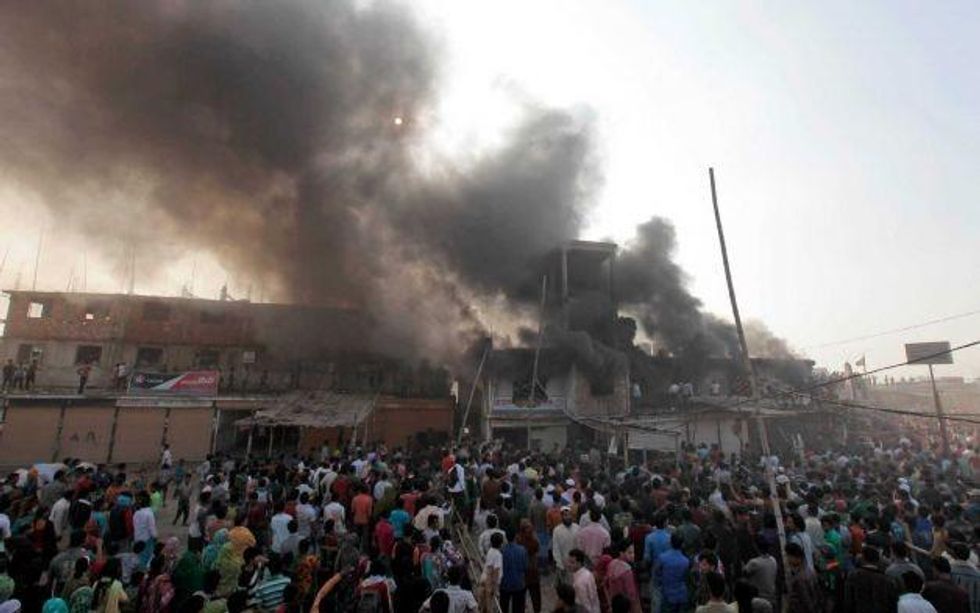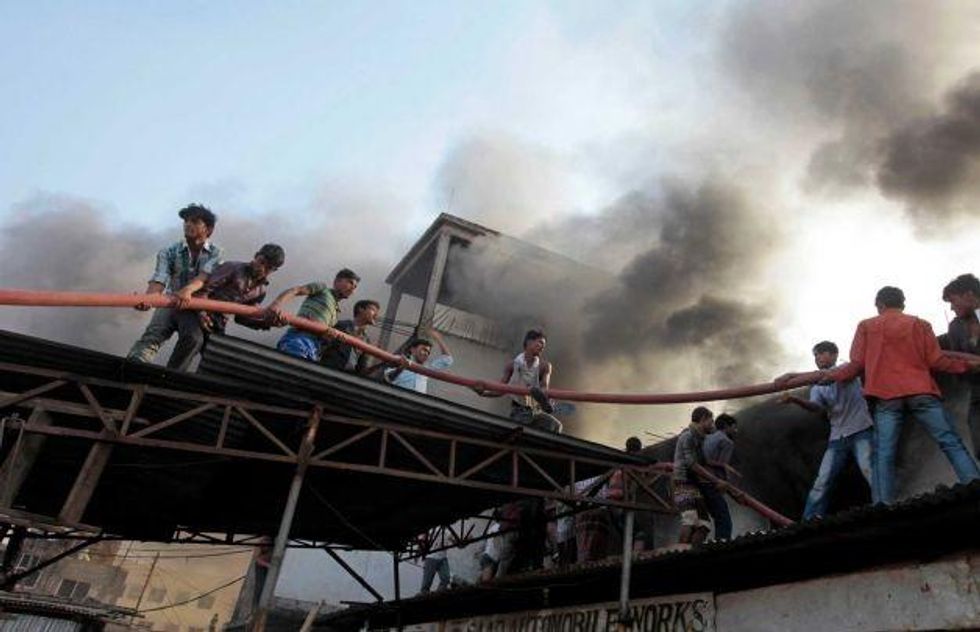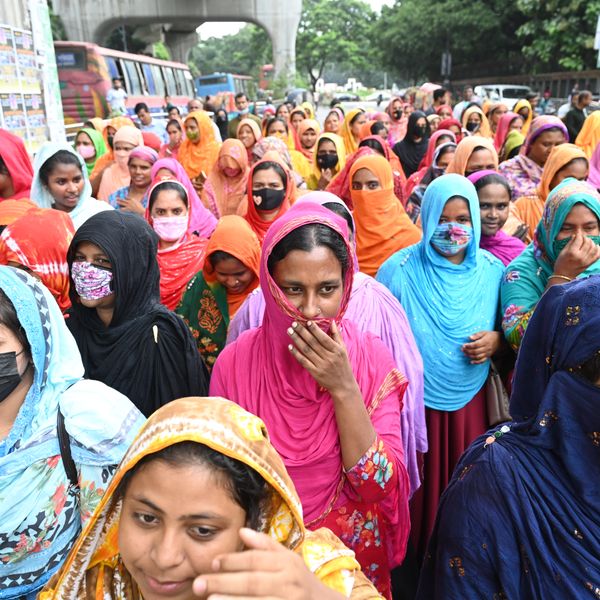Groups Slam Multinationals After Another Deadly Blaze in Bangladesh
Seven dead after exits likely locked during factory fire

The fire Saturday, which occurred at the Smart Export Garment Ltd. factory, killed seven female workers, an official said Sunday.
"When I tried to escape through the emergency exit I found the gate locked," Raushan Ara, a worker at the factory, told newspaper Prothom Alo.
Local reports said at least 50 people were injured in a stampede triggered by the fire. Several of the injured jumped out of the windows of the two-story factory, survivors said. Roughly 250 workers were in the factory at the time of the fire.
In November, a similar fire killed at least 112 workers in another garment factory near the capital--a record setting disaster in which all of the exits were locked with metal gates. The fire sparked international outrage and a call for tougher regulations on both factory owners and the international corporations which exploit their cheap labor.
Government official Jahangir Kabir Nanak said an investigation has been ordered into the cause of Saturday's fire and allegations that the emergency exit was locked.
Altaf Hossain, father of a garment worker killed on Saturday, has filed a police case against the three directors of the factory, accusing them of negligence involving the fire, Dhaka Metropolitan Police Sub-inspector Shamsul Hoque told The Associated Press on Sunday.
It was not immediately reported which, if any, international companies were in business with the factory.
However, in response to the fire and the likelihood that western corporations will be implicated in the disaster, on Sunday International labor rights groups called for global clothing retailers to ensure adequate safety measures for garment workers in Bangladesh, asking retailers and brands to sign a fire safety agreement with Bangladesh.
"After more than two decades of the apparel industry knowing about the risks to these workers, nothing substantial has changed," the Executive Director of the International Labor Rights Forum, Judy Gearhart, said in a statement issued along with The Worker Rights Consortium (WRC) and the Clean Clothes Campaign (CCC).
"Brands still keep their audit results secret. They still walk away when it suits them and trade unions are still marginalized, weakening workers' ability to speak up when they are at risk," she added.

An Urgent Message From Our Co-Founder
Dear Common Dreams reader, The U.S. is on a fast track to authoritarianism like nothing I've ever seen. Meanwhile, corporate news outlets are utterly capitulating to Trump, twisting their coverage to avoid drawing his ire while lining up to stuff cash in his pockets. That's why I believe that Common Dreams is doing the best and most consequential reporting that we've ever done. Our small but mighty team is a progressive reporting powerhouse, covering the news every day that the corporate media never will. Our mission has always been simple: To inform. To inspire. And to ignite change for the common good. Now here's the key piece that I want all our readers to understand: None of this would be possible without your financial support. That's not just some fundraising cliche. It's the absolute and literal truth. We don't accept corporate advertising and never will. We don't have a paywall because we don't think people should be blocked from critical news based on their ability to pay. Everything we do is funded by the donations of readers like you. Will you donate now to help power the nonprofit, independent reporting of Common Dreams? Thank you for being a vital member of our community. Together, we can keep independent journalism alive when it’s needed most. - Craig Brown, Co-founder |
Jacob Chamberlain is a former staff writer for Common Dreams. He is the author of Migrant Justice in the Age of Removal. His website is www.jacobpchamberlain.com.

The fire Saturday, which occurred at the Smart Export Garment Ltd. factory, killed seven female workers, an official said Sunday.
"When I tried to escape through the emergency exit I found the gate locked," Raushan Ara, a worker at the factory, told newspaper Prothom Alo.
Local reports said at least 50 people were injured in a stampede triggered by the fire. Several of the injured jumped out of the windows of the two-story factory, survivors said. Roughly 250 workers were in the factory at the time of the fire.
In November, a similar fire killed at least 112 workers in another garment factory near the capital--a record setting disaster in which all of the exits were locked with metal gates. The fire sparked international outrage and a call for tougher regulations on both factory owners and the international corporations which exploit their cheap labor.
Government official Jahangir Kabir Nanak said an investigation has been ordered into the cause of Saturday's fire and allegations that the emergency exit was locked.
Altaf Hossain, father of a garment worker killed on Saturday, has filed a police case against the three directors of the factory, accusing them of negligence involving the fire, Dhaka Metropolitan Police Sub-inspector Shamsul Hoque told The Associated Press on Sunday.
It was not immediately reported which, if any, international companies were in business with the factory.
However, in response to the fire and the likelihood that western corporations will be implicated in the disaster, on Sunday International labor rights groups called for global clothing retailers to ensure adequate safety measures for garment workers in Bangladesh, asking retailers and brands to sign a fire safety agreement with Bangladesh.
"After more than two decades of the apparel industry knowing about the risks to these workers, nothing substantial has changed," the Executive Director of the International Labor Rights Forum, Judy Gearhart, said in a statement issued along with The Worker Rights Consortium (WRC) and the Clean Clothes Campaign (CCC).
"Brands still keep their audit results secret. They still walk away when it suits them and trade unions are still marginalized, weakening workers' ability to speak up when they are at risk," she added.

Jacob Chamberlain is a former staff writer for Common Dreams. He is the author of Migrant Justice in the Age of Removal. His website is www.jacobpchamberlain.com.

The fire Saturday, which occurred at the Smart Export Garment Ltd. factory, killed seven female workers, an official said Sunday.
"When I tried to escape through the emergency exit I found the gate locked," Raushan Ara, a worker at the factory, told newspaper Prothom Alo.
Local reports said at least 50 people were injured in a stampede triggered by the fire. Several of the injured jumped out of the windows of the two-story factory, survivors said. Roughly 250 workers were in the factory at the time of the fire.
In November, a similar fire killed at least 112 workers in another garment factory near the capital--a record setting disaster in which all of the exits were locked with metal gates. The fire sparked international outrage and a call for tougher regulations on both factory owners and the international corporations which exploit their cheap labor.
Government official Jahangir Kabir Nanak said an investigation has been ordered into the cause of Saturday's fire and allegations that the emergency exit was locked.
Altaf Hossain, father of a garment worker killed on Saturday, has filed a police case against the three directors of the factory, accusing them of negligence involving the fire, Dhaka Metropolitan Police Sub-inspector Shamsul Hoque told The Associated Press on Sunday.
It was not immediately reported which, if any, international companies were in business with the factory.
However, in response to the fire and the likelihood that western corporations will be implicated in the disaster, on Sunday International labor rights groups called for global clothing retailers to ensure adequate safety measures for garment workers in Bangladesh, asking retailers and brands to sign a fire safety agreement with Bangladesh.
"After more than two decades of the apparel industry knowing about the risks to these workers, nothing substantial has changed," the Executive Director of the International Labor Rights Forum, Judy Gearhart, said in a statement issued along with The Worker Rights Consortium (WRC) and the Clean Clothes Campaign (CCC).
"Brands still keep their audit results secret. They still walk away when it suits them and trade unions are still marginalized, weakening workers' ability to speak up when they are at risk," she added.


